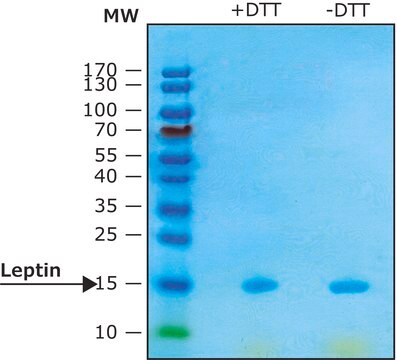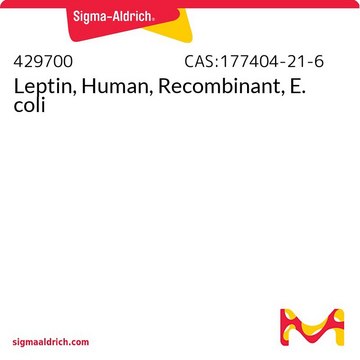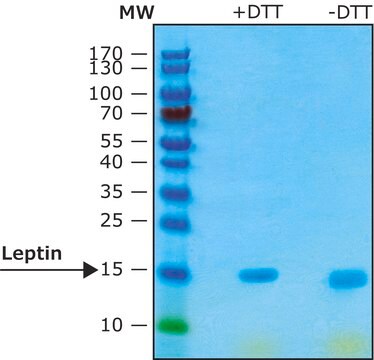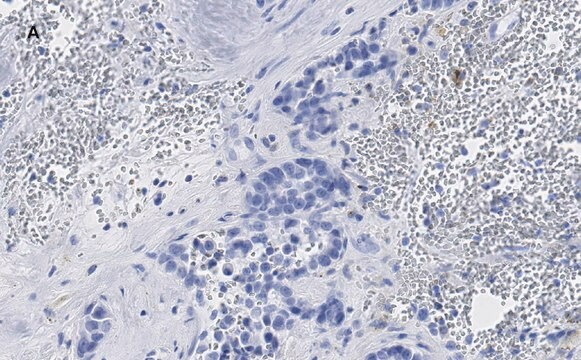L3772
Leptin from mouse
≥98% (SDS-PAGE), recombinant, expressed in E. coli, lyophilized powder
Synonym(s):
OB
About This Item
Recommended Products
biological source
mouse
Quality Level
recombinant
expressed in E. coli
sterility
non-sterile
Assay
≥98% (SDS-PAGE)
form
lyophilized powder
potency
≤1.0 ng/mL ED50
mol wt
predicted mol wt ~16 kDa
storage condition
OK to freeze
technique(s)
cell based assay: suitable
impurities
≤1.0 EU/μg endotoxin
UniProt accession no.
shipped in
ambient
storage temp.
−20°C
SMILES string
CC(C)CC(C(=NC(CCC(=N)O)C(=NCC(=NC(CO)C(=NC(CC(C)C)C(=NC(CCC(=N)O)C(=NC(CC(=O)O)C(=NC(CCSC)C(=NC(CC(C)C)C(=NC(CC1=CNC2=CC=CC=C21)C(=NC(CCC(=N)O)C(=NC(CC(C)C)C(=NC(CC(=O)O)C(=NC(CC(C)C)C(=NC(CO)C(=O)N3CCCC3C(=NCC(=NC(CS)C(=O)O)O)O)O)O)O)O)O)O)O)O)O)O)O)O)O)O)N
InChI
1S/C87H138N22O28S2/c1-41(2)27-48(88)72(121)97-50(18-21-65(89)112)73(122)93-36-68(115)95-61(38-110)84(133)104-54(28-42(3)4)77(126)98-52(20-23-67(91)114)75(124)106-59(33-70(117)118)82(131)100-53(24-26-139-11)76(125)102-55(29-43(5)6)78(127)105-58(32-46-35-92-49-16-13-12-15-47(46)49)81(130)99-51(19-22-66(90)113)74(123)101-56(30-44(7)8)79(128)107-60(34-71(119)120)83(132)103-57(31-45(9)10)80(129)108-62(39-111)86(135)109-25-14-17-64(109)85(134)94-37-69(116)96-63(40-138)87(136)137/h12-13,15-16,35,41-45,48,50-64,92,110-111,138H,14,17-34,36-40,88H2,1-11H3,(H2,89,112)(H2,90,113)(H2,91,114)(H,93,122)(H,94,134)(H,95,115)(H,96,116)(H,97,121)(H,98,126)(H,99,130)(H,100,131)(H,101,123)(H,102,125)(H,103,132)(H,104,133)(H,105,127)(H,106,124)(H,107,128)(H,108,129)(H,117,118)(H,119,120)(H,136,137)/t48-,50-,51-,52-,53-,54-,55-,56-,57-,58-,59-,60-,61-,62-,63-,64-/m0/s1
InChI key
NRYBAZVQPHGZNS-ZSOCWYAHSA-N
Gene Information
mouse ... Lep(16846)
General description
Leptin (Ob) is a non-glycosylated polypeptide hormone. It is produced primarily in adipocytes and the placenta. The structure of leptin closely resembles members of the long-chain helical cytokine family. It is composed of four antiparallel α-helices interconnected by two long crossover links and one short loop. These structural elements are arranged in a left-handed helical bundle formation, resulting in a unique two-layer packing configuration.
Application
- to check the effect of leptin on ovulation for treating infertility in obese mice
- to check the effect of leptin on MGARP (mitochondria-localized glutamic acid-rich protein) expression in testis and follicular granular cells of mice
- to study the morphometrical changes in mouse testicular tissue upon long term exposure to leptin
Biochem/physiol Actions
Human and mouse leptin share ~84% sequence identity.
Physical form
Analysis Note
Storage Class Code
11 - Combustible Solids
WGK
WGK 3
Flash Point(F)
Not applicable
Flash Point(C)
Not applicable
Personal Protective Equipment
Certificates of Analysis (COA)
Search for Certificates of Analysis (COA) by entering the products Lot/Batch Number. Lot and Batch Numbers can be found on a product’s label following the words ‘Lot’ or ‘Batch’.
Already Own This Product?
Find documentation for the products that you have recently purchased in the Document Library.
Customers Also Viewed
Articles
Lipid Induced Insulin Resistance
Our team of scientists has experience in all areas of research including Life Science, Material Science, Chemical Synthesis, Chromatography, Analytical and many others.
Contact Technical Service











